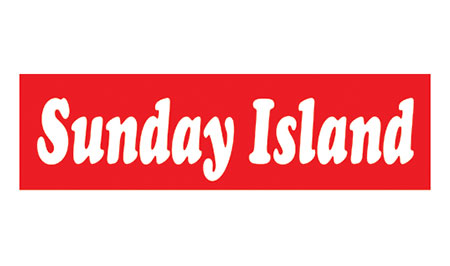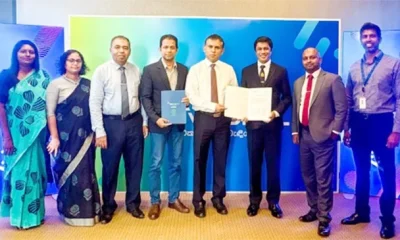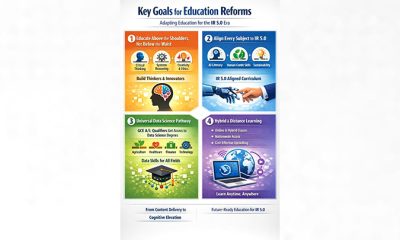Editorial
What next?

Given the raging Covid-19 pandemic threatening the entire country at present, Sri Lanka needs the current teachers protests ignoring all preventive protocols like a shot in the head. But there is no sign whatever, as this is being written, of any kind of truce between the teacher and the government. The rulers gave into pressure over the Kotelawela Defence University Bill last week by deferring its scheduled presentation to the legislature sine die. But there has been no backtracking on the teachers’ demands or the ban on the import of chemical fertilizers also attracting loud and crowded protests, Covid notwithstanding. The teachers are on record saying they will not back down. Meanwhile hundreds of thousands of pupils in government schools, already hurt by the pandemic restrictions, are not even getting the few distance learning opportunities the teachers say they were providing at their own expense.
Fortunately the government has abandoned its previous heavy-handed approach against teachers and other protesters that saw some teachers’ union leaders roughly arrested and hauled before the courts. They were bailed by the courts but not able to go home as the cops bundled them off to distant quarantine centers where delayed testing found them Covid negative. They were released just before the legal challenge they mounted over this issue was taken up by the courts, obviously because the government feared an adverse determination. The protests continue unabated, perhaps gathering fresh momentum with no signs whatever of any via media being achieved. The previous rough stuff telecast countrywide, perhaps somewhat helped the teachers as there is no formidable display of public anger over their Covid-endangering protests.
Our stablemate, The Island, last week carried a most thought provoking article by a senior retired public official, Mr. K.L.L. Wijeratne, branding the teachers’ pay hike demand “An Unjust Call.” He is eminently qualified to offer an opinion on the subject having long served the Salaries and Cadres Commission, both as Secretary (2006 to 2009) and Chairman from 2016 to 2019. All of us well know that teaching has been a poorly paid profession, perhaps the worst paid, for as long as anyone can remember. During the current wave of protest, teachers’ unions as well as their political backers have been loudly proclaiming that they are paid as little as between Rs. 1,000 to Rs. 1,500 a day. It wasn’t long ago that plantation workers were granted a thousand rupee daily wage in the teeth of protests by their employers that the industry just could not bear it and will surely be crushed.
We are also familiar with the fact that teachers, unlike most other employees, enjoy the school vacations thrice a year. They also had weekends off at a time the rest of the workforce had only half a day off on Saturdays. Mr. Wijeratne has given the cold, hard facts in his article saying that teachers work 180 five-hour days a year (around 900 hours) whereas other public servants work 240 eight-hour days (around 1,900 hours) a year. You don’t have to be a cynic to believe that the vast number of employees in our bloated public service, teachers or otherwise, put in far fewer hours into their workdays than they are supposed to. It is no doubt unfair to tar the entire public service with the same brush. But conceding that there are many exceptions, the rule is broadly true. We do not know whether there are any figures – though they must be available somewhere – on the gender balance between men and women in the teaching profession. But there is no doubt that a very large number of women have opted for teaching despite the poor compensation as it enables them to better balance their working and family lives.
Mr. Wijeratne has also given a telling example of how politicians, in this case President Chandrika Kumaratunga and the UNP’s late Srima Dissanayake, who was plunged into a presidential election following the tragic assassination of her husband, Gamini Dissanayake, during a presidential election campaign, drop more than a spot of dung into the pot of milk for political advantage. Here he quotes chapter and verse about CBK’s wise and proper approach to the teachers salary issue which has been simmering for the previous several decades. As finance minister, President Kumaratunga had in 1995 offered what the writer calls “well considered observations” on this subject. This was when she had in 1994 obtained cabinet approval for amending an earlier decision to establish a Sri Lanka Teachers’ Service with effect from October 1994 and implement the salary scaled proposed for that service from Jan. 1995. The amendment she proposed and was accepted required reference of the proposed salary scales to the Salaries and Cadres Committee “for a comprehensive examination and report before implementing the proposals.”
But voila what happened? Ms. Srima Dissanayake published a full page newspaper notice in October 1994 promising to implement the proposed salary scale for teachers and restructure the Principals’ Service, Teacher Education Service and Education Administrative Service. CBK gazetted the proposed salary scales the day her rival’s notice appeared, and as Wijeratne says, created the only instance “where salaries were gazetted before establishing a service!” This then was how the game was played and has continued to be played. The tottering economy cannot bear the weight of the demand which will trigger a myriad of similar demands from elsewhere. But seeing how others have won their demands, the teachers will not let go of the opportunity they have seized Covid or no Covid.
Editorial
Crime and cops

Saturday 17th January, 2026
The police headquarters has released an AI-generated image of a suspect wanted in connection with a fatal shooting incident in Dehiwala on 09 Jan., 2026, and sought public assistance to arrest him. AI has made the task of creating facial composites much easier. The public no doubt must cooperate with the police and help combat crime, but much more needs to be done to neutralise the dangerous underworld gangs.
Two notorious criminals and a female suspect arrested in Dubai were brought back yesterday. Dubai has become a haven for Sri Lankan criminals, and everything possible must be done to arrest all of them there and repatriate them here to stand trial for their crimes.
There have been several shooting incidents so far this year, and a couple of lives, including that of a teenager, have been lost. Last year saw more than 100 incidents of gun violence, which claimed scores of lives. One can only hope that the police will be able to bring the situation under control this year. Hope is said to spring eternal.
Underworld gangs have amply demonstrated their ability to strike at will anywhere although some of their leaders have been arrested. The police swing into action after shooting incidents and go hell for leather to arrest the shooters; in some cases, they succeed in their endeavour. Crime prevention is apparently not their forte.
Last year, a much-advertised campaign was launched to crush crime syndicates involved in drug dealing, killings and gun running. It yielded some discernible results, but very little is heard of it these days. Has it gone the same way as the past anti-crime operations?
Identikits, manually created or A-generated, could be deceptive in some cases however useful they may be in tracking down criminals on the run. This is a fact investigators should bear in mind lest they should arrest the wrong persons and torture them in the name of interrogating them.
It was alleged last week that the police had put a man to the question simply because he resembled a suspect in an identikit released to the media. The victim has claimed that he went to a police station in Colombo of his own volition after realising that there was a striking similarity between him and the suspect composite in question, only to be beaten mercilessly and asked to make a confession to a crime that he had not committed. The police have denied his claim. A thorough investigation must be conducted into the alleged incident.
Cases of mistaken identity are not rare in Sri Lanka, where the police make arrests hastily and consider suspects guilty until they are proven innocent. They have earned notoriety for acting according to their whims and fancies or at the behest of their political masters in arresting suspects. This is one of the reasons why the conviction rate remains extremely low in this country. It is between 4% and 6%. Some studies have even placed it at 2%.
Meanwhile, the Criminal Investigation Department (CID) must not be made to conduct politically motivated investigations, which prevent it from carrying out its duties and functions efficiently. Its raison d’etre is probing crimes, but successive governments have reduced it to a mere appendage of the party in power. Today, the situation has taken a turn for the worse, with government politicians rushing to the CID at the drop of a hat, demanding investigations. This practice must be brought to and end.
Editorial
The Chakka Clash

Friday 16th January, 2026
Never a dull day in Sri Lanka, where controversies abound. As if the ongoing political war on the government’s hurriedly introduced education reforms were not enough, there is a dispute over a religious symbol, of all things, The Opposition has taken exception to an image in a newly crafted learning module. SJB and Opposition Leader Sajith Premadasa insists that the symbol described as the Dhamma Chakka in the textbook is in fact the Ashoka Chakra. He took up the issue in Parliament last week, demanding an explanation from the government. Several other Opposition politicians have expressed similar views.
Responding to Premadasa’s argument, Prime Minister and Minister of Education and Higher Education Dr. Harini Amarasuriya told the House that the Buddhist symbol in the school textbook, introduced under the new education reform programme, looked similar to the Ashoka Chakra, but it was the Dhamma Chakka approved by the Ministry of Buddhist Affairs, the Advisory Council on Buddhist Affairs and the Maha Nayake Theras of the Asgiriya and Malwathu Chapters. However, the debate over the symbol in question is far from over; the Opposition politicians and their propagandists continue to castigate the government. The Chakka issue has left the public confused.
There have emerged two schools of thought over the Buddhist symbol in the school textbook. Differences between the Dhamma Chakka and the Ashoka Chakra are not limited to their distinct shapes alone, according to the critics of the symbol at issue. They have pointed out that the Dhamma Chakka symbolises the Noble Eightfold Path and moral law or Dhamma while the Ashoka Chakra represents law and justice (or dhamma in a civic sentence), movement, progress, good governance and discipline, and therefore in today’s context it is secular and not religious, as such. The Dhamma Chakka is found in Buddhist temples, stupas, manuscripts and religious art while the Ashoka Chakra is mostly in the Indian national flag, government emblems and currency and official seals. The rival school of thought insists that the symbol in the textbook is the real Dhamma Chakka and what the Opposition has taken up is a non-issue.
The ongoing debate is of immense interest in that the traditional Dhamma Chakka is known as a sacred Buddhist symbol of spiritual law and the path to liberation. The Ashoka Chakra has become a modern national symbol of India; it has been inspired by the Dhamma Chakka but used mostly in a secular context. The question is what prompted the government to use a symbol other than the traditional Dhamma Chakka in a school textbook, and thereby spark a controversy unncessarily.
Ironically, the NPP government drawing criticism for using a symbol that is confused with the Ashoka Chakra, a national symbol of India, is led by the JVP, which once launched a violent anti-Indian campaign and even gunned down traders who sold Indian onions or local varieties that resembled them. The government finds itself in a dilemma. Its critics maintain that the Dhamma Chakka in Sri Lanka’s state emblem is different from what the government calls the real Dhamma Chakka approved by the Ministry of Buddhist Affairs, the Advisory Committee on Buddhist Affairs and some Maha Nayake Theras. How can this glaring discrepancy be rectified? There cannot be two different Dhamma Chakkas—one in the state emblem and the other in school textbooks or elsewhere, according to those who want the government to stick to the traditional Dhamma Chakka.
It is imperative that the government, the Ministry of Buddha Sasana, the Opposition, the Maha Sangha, Buddhist scholars and other stakeholders address the Chakka issue urgently and clear up public confusion.
Editorial
Reforms, frogs and tortoises

Thursday 15th January, 2026
The government finally swallowed its pride and postponed the implementation of education reforms meant for Grade 06. It has said its reform initiative is on track, but it is very likely to avoid a headlong rush. It may not concede defeat, but it is obviously wary of performing another high-wire act without a safety net amidst protests.
The government has done itself a favour by shelving the education reforms for Grade 06. Protests tend to snowball, and the Satyagraha campaigns, rallies and marches against the education reforms have the potential to develop into another ‘go-home’ movement.
The opponents of the current education reforms are now demanding that the government deep-six its reform package wholesale and ensure that the architects thereof bear the cost of error-ridden modules, amounting to about Rs. 70 million. Their message is loud and clear; those who wasted state funds for printing those modules will face legal action when the NPP loses power.
The Opposition and the trade unions critical of the proposed education reforms are still out for Prime Minister Dr. Harini Amarasuriya’s scalp, blaming her for the reform mess in the education sector. They are also making many unsubstantiated allegations against her. Trouble is far from over for her and the government.
Now that all stakeholders have agreed that the education system needs reform, the government should begin formulating education reforms anew while adopting an inclusive approach. The best way to set about the task of introducing reforms in any sector is to consult all key stakeholders and secure their concurrence.
The NPP government led by the JVP, which is a great admirer of the Chinese Communist Party, should have adopted the gradual trial-and-error approach recommended by Deng Xiaoping, and crossed the river by feeling the stones. Instead of taking one experimental step at a time and adapting to circumstances, the NPP government made the mistake of plunging headfirst into reforming the education system.
It has been proposed that the government set up a Presidential Task Force consisting of experts, political representatives, trade unionists and other stakeholders to reform the education system. This proposal deserves serious consideration. A broadly representative task force will help ensure the smooth implementation of education reforms. Well begun is said to be half done.
Meanwhile, Tuesday’s meeting between President Anura Kumara Dissanayake and some trade unions representing teachers and principals has been viewed in some quarters as part of a divide-and-rule strategy, for it has caused a rift between the trade unionists invited by the President and others, who claim that the event was scripted. However, those who met the President on Tuesday have thrown their weight behind the campaign to recover the cost of poorly crafted learning modules that have been shelved.
President of the All Ceylon United Teachers’ Association Ven. Yalwala Pannasekera Thera, one of the trade unionists who met the President on Tuesday, has given a karmic twist to the education reform issue. Tearing into the NPP politicians and state officials responsible for printing the badly drafted modules, he said yesterday those who misused funds meant for children would be reborn as frogs in Beira Lake and tortoises in the Kandy Lake.
Politicians who misuse state funds and abuse power may find themselves in the company of frogs and tortoises even before they go the way of all flesh. One may recall that in 2022, some politicians of the previous dispensation and their supporters swam with frogs in Beira Lake, where angry mobs plunged them. The same fate is likely to befall all politicians who let power get the better of them, resort to highhanded action, flaunting mandates and supermajorities, and thereby test the public’s patience.
-

 Business2 days ago
Business2 days agoKoaloo.Fi and Stredge forge strategic partnership to offer businesses sustainable supply chain solutions
-

 Business6 days ago
Business6 days agoDialog and UnionPay International Join Forces to Elevate Sri Lanka’s Digital Payment Landscape
-

 Editorial1 day ago
Editorial1 day agoThe Chakka Clash
-

 News6 days ago
News6 days agoSajith: Ashoka Chakra replaces Dharmachakra in Buddhism textbook
-

 Features6 days ago
Features6 days agoThe Paradox of Trump Power: Contested Authoritarian at Home, Uncontested Bully Abroad
-

 Features6 days ago
Features6 days agoSubject:Whatever happened to (my) three million dollars?
-

 Business2 days ago
Business2 days agoSLT MOBITEL and Fintelex empower farmers with the launch of Yaya Agro App
-

 Features1 day ago
Features1 day agoOnline work compatibility of education tablets













